What could the SNP-Green deal mean for Scotland?
- Published
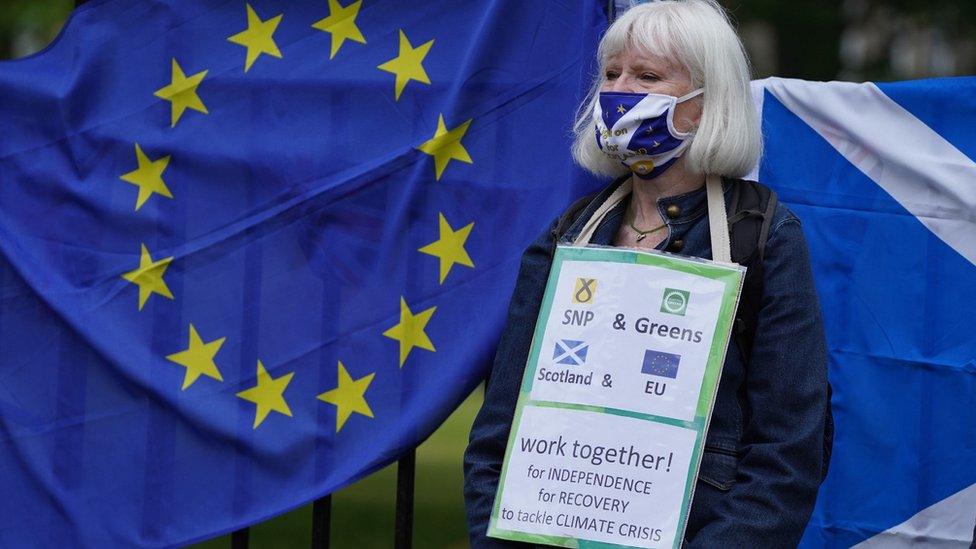
A campaigner outside Bute House as the agreement was announced
The SNP and the Scottish Greens have revealed details of the co-operation agreement which will see the parties work together at Holyrood. What could the deal mean for Scotland over the next five years?
Climate policies
The most obvious reason for the SNP to bring the Greens into government is to present a united front against the climate emergency, in the year Glasgow hosts the COP26 conference.
However, as a flagship issue for the Greens - the clue is in the name - this is a topic the parties have clashed on frequently.
The Greens did not vote in favour of the Scottish government's climate bill in the last term of parliament, saying the targets it set - for a 75% reduction in carbon emissions by 2030 - were not ambitious enough.
However, their 2021 election campaign was more about hitting these goals than stretching them, with the 80% figure they pledged in the 2019 general election absent and co-leader Patrick Harvie saying the most important thing is now to deliver on the promises made.
On that front, the Greens want to see "a fundamental transformation of our economy and society", saying that "every industry, every part of our economy and every individual will need to rise to the challenge".
So not only would there be more pressure on ministers to hit their emissions targets - having fallen short of many of them so far - there would be calls for change across more or less every portfolio area.
Specific policies championed by the Greens include phasing out single-use and non-essential plastics by 2025; the introduction of more Low Emission Zones in cities; and banning the sale of new petrol and diesel cars from 2026 and boilers which run on fossil fuels by 2028.
Confidence votes
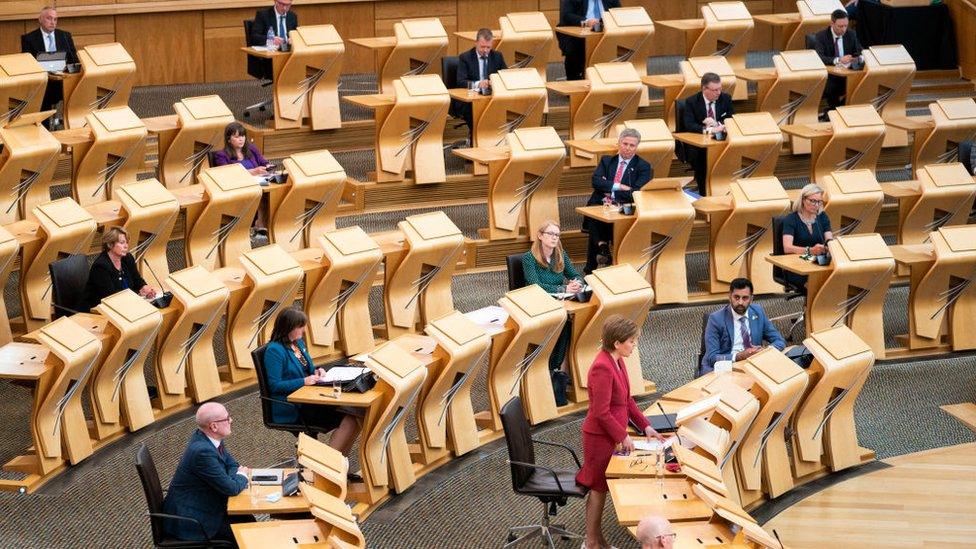
Striking a deal would give the SNP and Greens a comfortable majority in the Holyrood chamber
The other key motivation for the SNP in doing a deal is security - essentially making the coming parliamentary term an easier ride.
Nicola Sturgeon herself faced a confidence vote in the final days of the last session, although her position was never truly in danger.
But her deputy John Swinney was in real trouble on several occasions, with the Greens joining other opposition parties in calling for his head if he didn't back down in rows over school exams and the publication of government legal advice.
With the Greens signed up to a formal deal, the prospect of any minister being forced out by opposition pressure recedes.
Not only that, the SNP no longer need to worry about getting their budgets through parliament - or at least, they only have to worry about doing a deal with their Green partners.
This would make Kate Forbes' job as finance secretary slightly easier each February, in that she wouldn't need to sit down with rivals like Murdo Fraser and Jackie Baillie, or have to make concessions to the Lib Dems.
However, the Greens may still be looking for a decent return in exchange for passing up the annual opportunity to put the government over a barrel.
Economic recovery
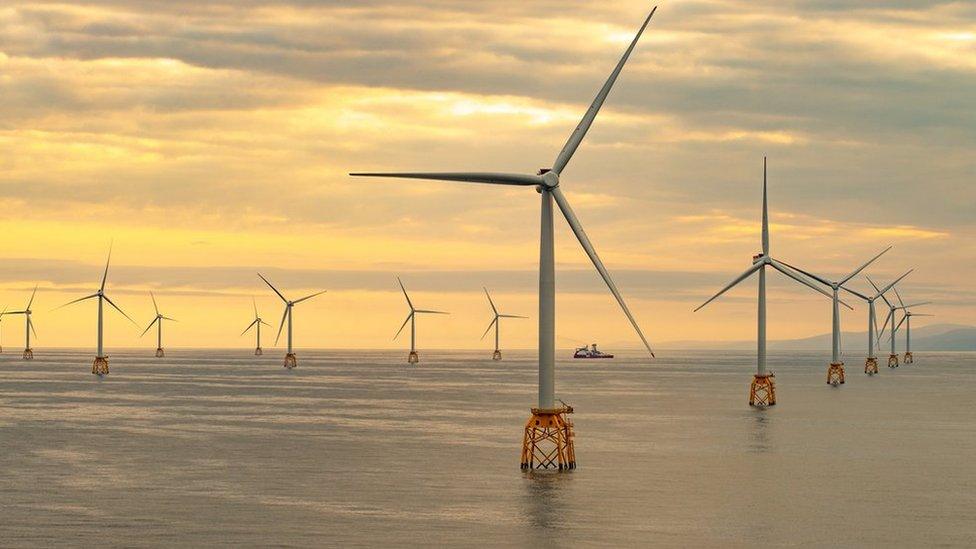
The SNP and the Greens have both called for major investment in infrastructure - particularly in green energy and renewables
It is unclear as yet how the monumental relief programmes of the pandemic era will be paid for, and what that means for future budgets.
The decisions on how to recover from the economic crisis which accompanied the health one were already going to be tricky, before they involved two parties with subtly different ideologies.
Take for example the principle of economic growth. The SNP manifesto - while stressing that growth should be sustainable - talks about increasing Scottish GDP by more than £4bn. The Greens meanwhile are suspicious of the whole concept of "endless economic growth", with their election platform decrying "the deep shortcomings of conventional economics".
So what might actually happen, in practice?
The manifestos of each party pledged massive investment in infrastructure in an attempt to build a more sustainable economy post-pandemic, so this is something they will likely be able to work together on - so long as it doesn't involve big road-building projects.
Both parties have talked about moving to a four-day working week and back some form of universal basic income, so their pact might move these ambitious policies up the priority list.
The two are also largely aligned on income tax, with the SNP targeting "stability" across the next five years and the Greens agreeing that "now is not the time for increases" for most.
Both have promised a Citizens Assembly on taxation to study wider reforms, so that should be another easy box to tick.
The Greens want to scrap the council tax, something the SNP have pledged to do on various occasions - but never quite delivered. Could a deal here finally push reforms to local government funding over the line?
And the Greens also want to push for more fiscal powers to be devolved from Westminster so that they can set up things like an annual wealth tax on anyone worth more than £1m (including property, pensions and other assets) and a tax on carbon emissions from corporations.
Oil and gas industry
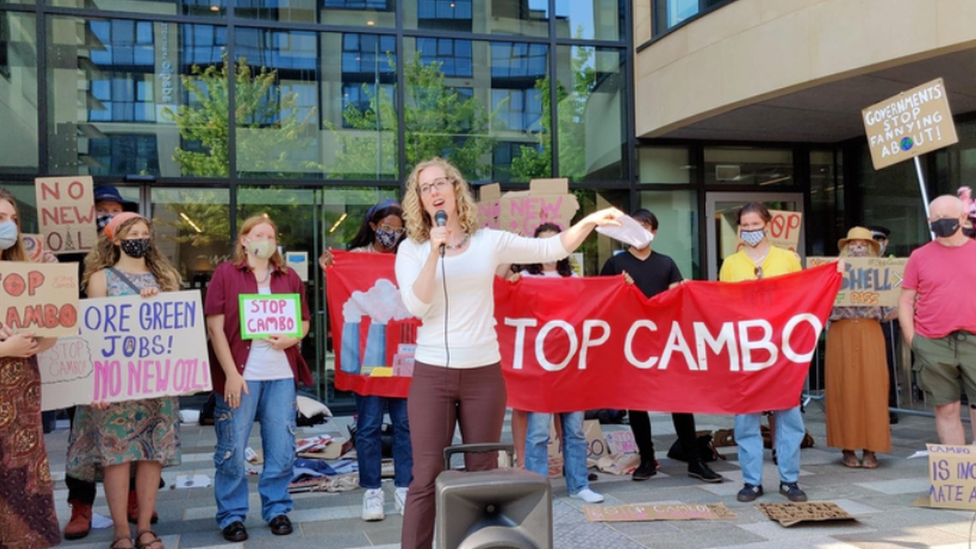
Green MSPs will be free to disagree with the SNP over the future of the oil industry - but will they also try to win them round?
One sector we are likely to hear a lot about is the oil and gas industry. There will doubtless be a clause in any SNP-Green deal allowing the parties to disagree amicably on things like how quickly to move on from fossil fuels, but it doesn't mean there wouldn't be friction behind the scenes - and indeed some lobbying.
Take for example the issue of new licences for drilling in the waters around Scotland, like the proposed new Cambo oil field. The Greens have already said they are putting "maximum pressure" on the Scottish government to oppose such plans.
The SNP insists this is solely a matter for the UK government, with offshore oil and gas contracts being in Westminster's remit.
But of course that hasn't stopped them taking a view on various other reserved matters, from Trident to Universal Credit and indeed the Acts of Union.
Ministers have thus far refused to come off the fence about Cambo, perhaps anxious about alienating oil industry workers - but might having Green voices closer to the heart of government tip the scales somewhat?
Co-leader Lorna Slater recently attended a protest against the development. Would she really never bring it up if she happened to be in the next office over from the energy minister?
Gender Recognition Act reform
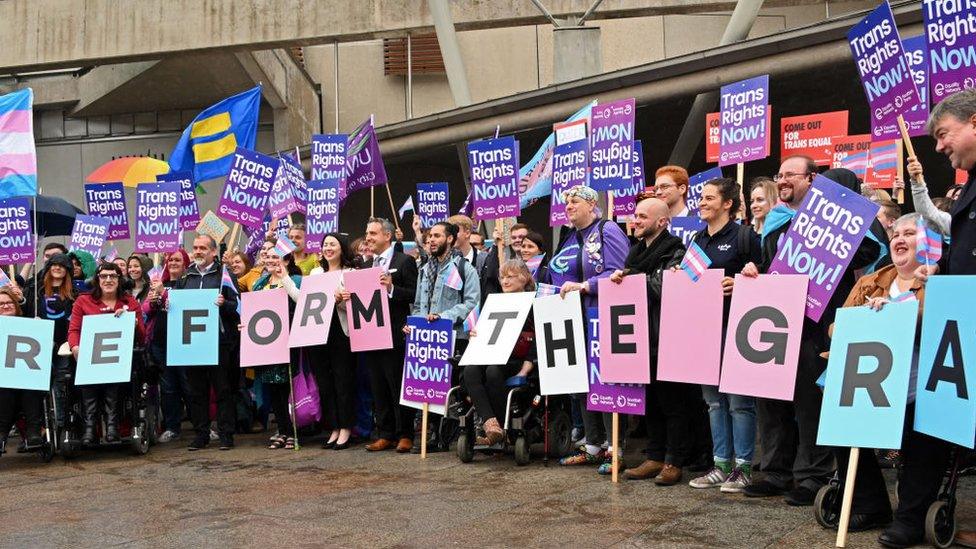
Green MSPs have joined trans rights campaigners in rallying ouside Holyrood
The issue of trans rights and reform to the Gender Recognition Act has been a sticky one for the SNP, and society more generally.
The government wants to change the law to make it easier for people to change their legally recognised gender, and reduce the "trauma" associated with the process. However, it has run into a row over whether allowing people to self-identify their gender could undermine the legal protections given to women under the Equality Act.
Prominent SNP figures have voiced concerns about the plans, and even post-election - with a new group of MSPs lined up behind the leadership and more critical voices like Joan McAlpine no longer in parliament - there could have been a backbench rebellion over elements of the legislation.
The Greens, though, are all-in on the policy - to the extent that they split with former MSP Andy Wightman over it.
Seven extra votes would make it much easier for the SNP to fulfil their manifesto pledge to make changes "at the earliest opportunity".
The agreement between the parties, external promises that a bill to reform the Gender Recognition Act will be introduced in the first year of the parliamentary session.
Indyref2
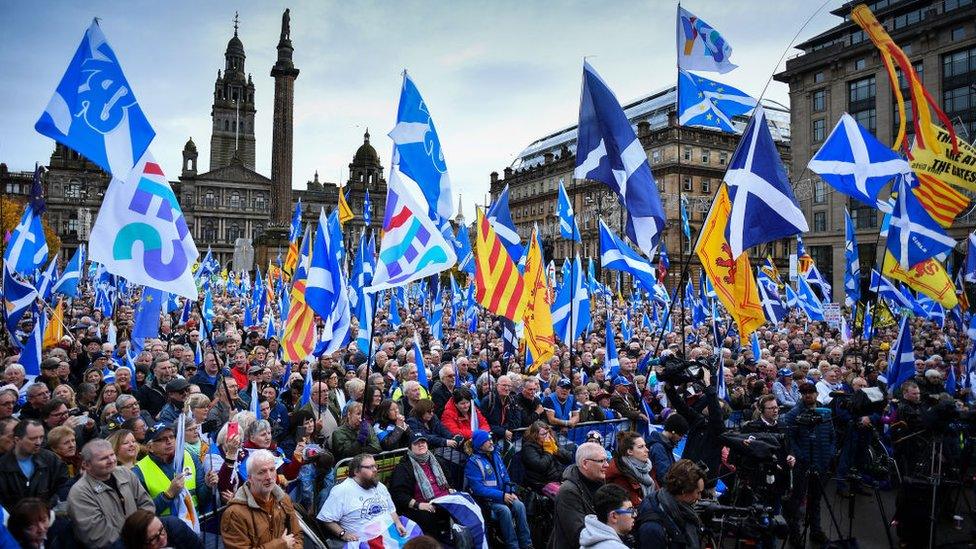
This may be one of the most talked about elements of the deal, but may actually be the part where an accord is needed the least.
During the election campaign, the Greens pledged that every one of their MSPs would back a new independence referendum - much like those of the SNP.
The two manifestos were closely aligned in a bid to cement the mandate of any pro-independence majority - so the votes for indyref2 are essentially in the bag regardless.
The real question is whether a formalising of the pro-independence bloc at Holyrood could have any impact in swaying the UK government when it comes to backing a new referendum.
There remains little sign that Prime Minister Boris Johnson has had a change of heart, but the SNP and Greens may hope that in the longer term a formal arrangement might help make the case seem all the more undeniable.